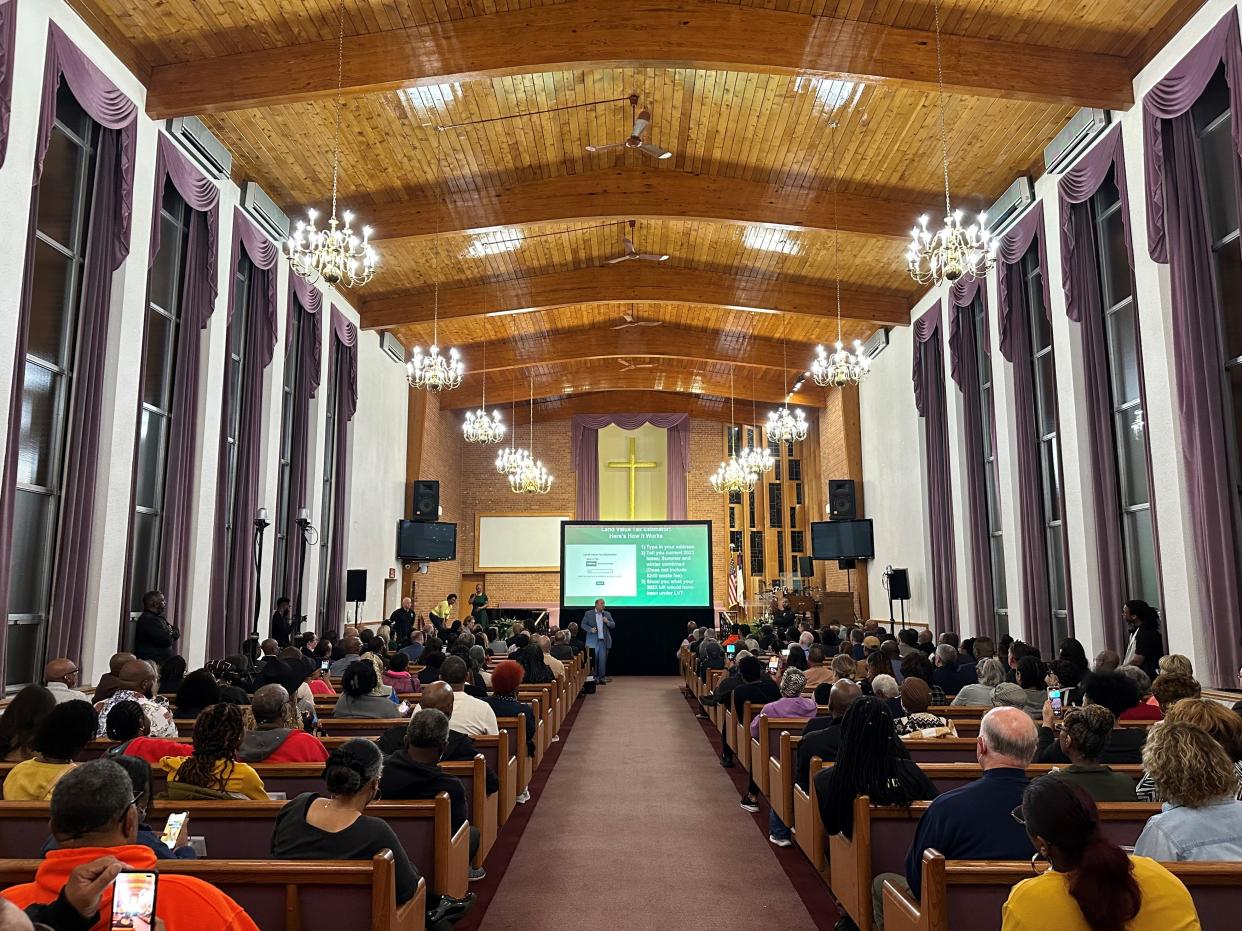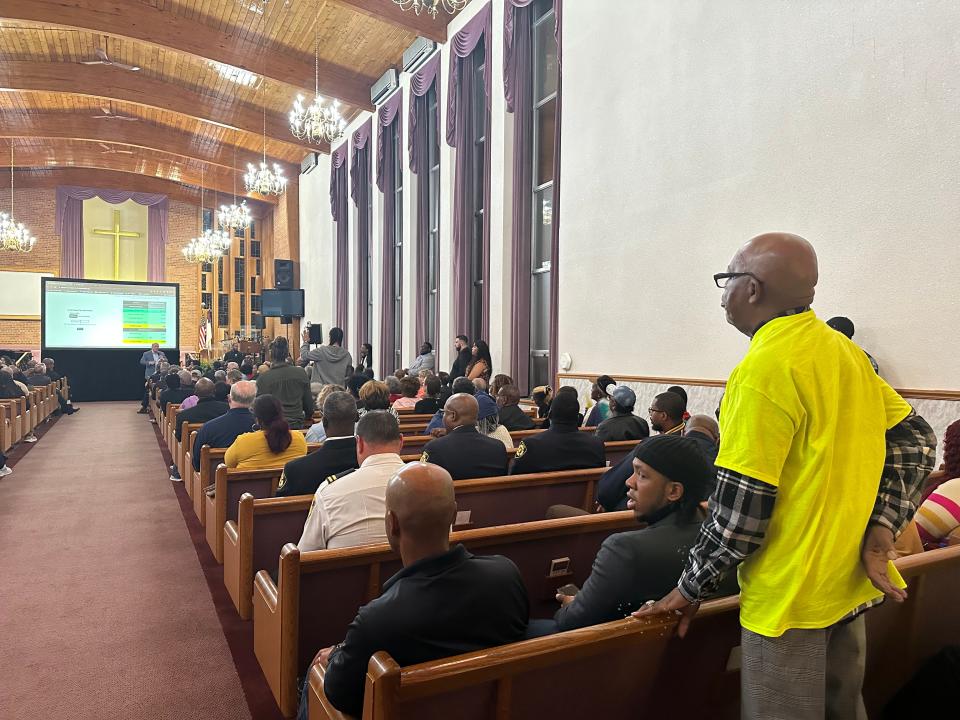Duggan says Detroit land tax plan would cut homeowner costs, but not everybody is on board

- Oops!Something went wrong.Please try again later.
Detroit property taxes might change if a proposed land tax gets enough support from Michigan lawmakers and Detroit voters, though residents are divided.
In an effort to sell the proposed Land Value Tax plan to Detroiters, Mayor Mike Duggan introduced an online tool estimator to show whether residents' overall taxes will increase based on where they live. The tool will launch on Monday on the Land Value Tax page of the city's website.
Speaking Thursday at Macedonia Baptist Church, Duggan asked residents to share their addresses to show the potential difference in their bills based on current taxes, of which many were told they would save between $100 to $200 a year, depending on the property size and using a 17% average cut. The plan is intended to tax vacant land owners at higher rates than those with homes or structures on their properties. At least 97% of homeowners are expected to get a tax cut if the plan passes — though it remains stalled in the Michigan Legislature.
"We're going to cut taxes on buildings, houses and the like, and double the taxes on the land, which means you as a homeowner pay less, people who own abandoned buildings, they pay more. People who have surface parking lots, they pay more. People with scrap yards and auto yards ... they pay more," Duggan said.
The remaining percentage of homeowners who may not see cuts includes those with smaller homes on bigger lots in high value land areas, such as downtown, Midtown and Corktown. Owners of downtown surface lots will see the biggest increases, he said. Taxes on side lots will go up an average of $26 but those with four or fewer plots will not face increases. Questions loomed from residents about whether the plan would benefit big developers scooping up land and receiving incentives to build.
"That's the point. We want building. We want people who own vacant lots and neighborhoods to build houses," Duggan said, adding that in the next five to 10 years, he predicts the city's 30,000 vacant lot owners, which he calls land speculators, will transfer more than half of them over to urban farmers, residents, homebuilders and others.
"I want to make it more expensive than just sit there, write a check to do nothing while you bring down the neighborhood. I'm not saying this is the whole solution. But it moves the average Detroit homeowner to a tax rate that is comparable to Warren, Southfield, Dearborn and Grosse Pointe," Duggan said.
However, residents are mixed about whether the plan would benefit them.
Imara Hyman, who is part of Detroiters for Tax Justice, called it "unconstitutional." Detroiters for Tax Justice aims to prevent the transfer of public money and property to private corporations at the expense of residents and the public mission is to stop the transfer of public money, public land and public assets to private corporations at the expense of residents, schools and libraries.
"It's still inequitable, because if you have a big house that may be worth half a million dollars, you don't have that much unused land. So your savings is going to be way more than the small person," Hyman said.
Resident Jocelyn Harris, also part of the organization, worries the plan would benefit developers more than it would residents.
"In the long run, there's going to be more land for them to develop," Harris said. "The people who live in these houses, they don't have a lot of money."
Harris added that if the plan was "so good" then it should be applied to other cities. Currently, cities with a population of at least 500,000 would qualify for the proposed plan. Duggan slammed the group, saying members were paid to spew misinformation to state lawmakers, including claims that residents would lose their properties.
"He's defacing and demeaning citizens such as myself, belittling us. No one pays Detroiters for Tax Justice, period. We're all citizens and we're interested in knowing our taxes are done fairly. We started before this Land Value Tax," Harris said. "If we weren't standing on shaky ground, the House would have passed that bill by now and it would have gone on to the Senate. It has not because it's too risky."
Others support the plan, including one resident who moved from New York to renovate a Detroit Land Bank Authority home and used the opportunity to let Duggan know how the entity dismissed him. Charles Cousin purchased the home 1½ years ago, restored it and said it was taken away from him. A contractor called to notify him a month ago to show his deed or risk losing his home and upon rushing back to his home, he noticed the door was kicked in.
"For me to fix up a property and then you take it back and try to resell it, that's not OK," Cousin said.
Duggan and Land Bank officials assured Cousin they would resolve the matter. Cousin went on to support the proposed plan with the thought that it may revitalize Detroit.
"Gentrification also affects people," Cousin said. "I just hope that the truth is out there. I'm not about people lying in church. Hopefully, I can help with that change. That's what I'm here to do, to be a productive member of the community."

Northwest Goldberg resident Ernest Johnson said while donning a bright yellow shirt stating "lower our property taxes" that he sees the plan as another way to eliminate Detroit's blight.
"On the corner of Dexter and West Grand Boulevard ... this used to be the Fisher YMCA. It had a swimming pool, basketball court, track, shower, everything. The guy that owned the building was sitting on it for 10 years, it looks like now, and he's just waiting on somebody to give him more than what he paid for it. ... Double his taxes," Johnson said.
Harrison Shelby, who lives in Detroit's old Redford neighborhood, is spending time learning the plan before making a decision but sees some value.
"This could be a sunset (law) where if it doesn't work, it could be phased out after three years," Shelby said. "Detroiters are hurting bad and they need some kind of relief."
Shelby also sees it as an opportunity to spur development but said "stronger teeth" are needed to hold developers accountable, citing the Mammoth building as an example for property that has sat vacant for years.
"He could sit on it for up to three years and he doesn't really have to do any kind of improvement," Shelby said. "But I would love to see a lot of these abandoned buildings and vacant properties be developed, especially in the neighborhoods."
The city assessor's office will likely require up to a $1.5 million increase in the budget if the proposal passes, Duggan added.
Dana Afana is the Detroit city hall reporter for the Free Press. Contact Dana: dafana@freepress.com or 313-635-3491. Follow her on Twitter: @DanaAfana.
This article originally appeared on Detroit Free Press: Detroit's Land Value Tax plan would cut homeowners' property taxes

